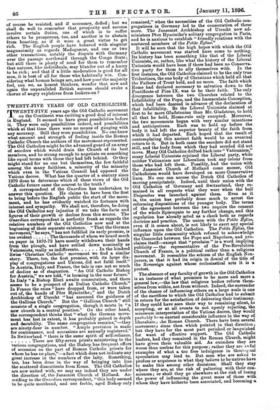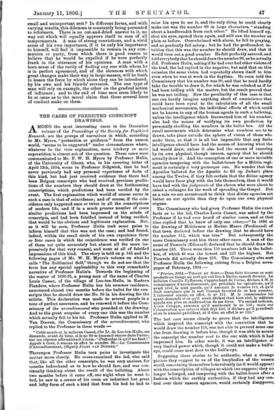TWENTY-FIVE YEARS OF OLD CATHOLICISM. T WENTY-FIVE years ago the Old
Catholic movement on the Continent was exciting a good deal of interest in England. It seemed to have great possibilities before it. They were only possibilities indeed, and possibilities which at that time there were no means of gauging with any accuracy. Still they were possibilities. No one knew what amount and strength of feeling inside the Roman Catholic Church the authors of the movement represented. The Old Catholics might be the advanced guard of an army of seceders which would drain the Church of its best members, and be strong enough to negotiate on something like equal terms with those they had left behind. Or they might stand for no one but themselves, the few faithful among the many faithless, a minority of the minority which even in the Vatican Council had opposed the Vatican decree. What has the quarter of a century since 1870 done to determine which of these views of the Old Catholic future came the nearest to the truth ?
A correspondent of the Guardian has undertaken to answer this question. He claims to have been the first to bring before the English public the start of the move- ment, and he has evidently watched its fortunes with interest and sympathy. We shall not, therefore, be doing the Old Catholics any injustice if we take the facts and figures of their growth or decline from this source. The Guardian correspondent is perfectly frank as regards the relative numbers of the Old Catholics now and at the beginning of their separate existence. "That the German movement," he says, " has not fulfilled its early promise, is too evident The thousands of whom we heard much on paper in 1870-72 have mostly withdrawn their hands from the plough, and have settled down nominally as Vaticanists, really as indifferents In the kindred Swiss ' Christian Catholic' movement we find a similar story. There, too, the first promise, with its large dis- play of congregations and Unions, did not fulfil itself." In Austria, Italy, and France, the tale is one not so much of decline as of stagnation. "An Old Catholic Bishop for Austria," we are told, "is looming in the near future." In Italy " a Bishop Elect awaits consecration, and there seems to be a prospect of an Italian Catholic Church." In France the reins " have dropped from, or were taken out of, the hands of Pere Hyacinthe ; " and the Dutch Archbishop of Utrecht " has assumed the guidance of the Gallican Church." But the " Gallican Church " still consists of a single congregation, though it meets in " a new church in a central position." On the other hand, the correspondent thinks that " what the German move- ment has lost in extent, it has probably gained in depth and durability. The same congregation remains,"—they are ninety-four in number. "Ample provision is made for continuance, and accessions are annually registered." In Switzerland " there is the same spirit of self-reliance.
There are fifty-seven priests ministering to the various congregations, and the Bishop has frequent offers of accession on the part of Roman Catholic priests for whom he has no place,"—a fact which does not indicate any great increase in the numbers of the laity. Something, too, has been done in the way of bringing into line the scattered dissentients from Rome. The Old Catholics are now united with, we may say indeed they are under the direction of, the Jansenist Church of Holland. Ac- cording to the Guardian correspondent, "this body seemed to be quite moribund, and one feeble, aged Bishop only remained," when the necessities of the Old Catholic con- gregations in Germany led to the consecration of three more. The Jansenist Archbishop of Utrecht now ad- ministers Are Hyacinthe's solitary congregation in Paris, and he is anxious to establish " friendly relations with the scattered members of the Petite Pglise. '
It will be seen that the high hopes with which the Old Catholic movement was started have come to nothing. Its history has been something like that of the Liberal Unionists, or, rather, like what the history of the Liberal Unionists would have been if there had been no Conserva- tive party for them to ally themselves with. In the instance, nstance, the Old Catholics claimed to be the only true Tridentines, the one body of Christians which held all that the Fathers of Trent held, and no more. The faith which Rome had declared necessary to salvation down to the Pontificate of Pius IX. was to be their faith. The only divergence between the two Churches related to the Infallibility of the Pope, and the Immaculate Conception, which had been decreed! in advance of the declaration of that infallibility. So the Liberal Unionists claimed at first to be more Gladstonian than Mr. Gladstone, to hold all that he held, Home-rule only excepted. Moreover, the two movements began with very similar intentions and anticipations. Each was to hold up before the body it had left the superior beauty of the faith from which it had departed. Each hoped that the result of contemplating this ancient faith would be an eventual return to it. But in both cases the seceders did not stand still, and the body from which they had seceded did not move. Many Old Catholics drifted back into " Vaticanism," many Liberal Unionists rejoined the Liberal party, while neither Vaticanism nor Liberalism took any colour from those who had left them. Possibly, had the union with the Jansenist Church of Holland come sooner, Old Catholicism would have developed on more Conservative lines. No one can accuse the Dutch Old Catholics of moving precipitately. Indeed, until their union with the Old Catholics of Germany and Switzerland, they re- mained in all respects what they were when the bull Unigenitu,s was launched against them. Even as it is, the union has probably done much to arrest the reforming dispositions of the younger body. The terms of the agreement between the two require the consent of the whole Episcopate to any further change, and this regulation has already acted as a check both as regards doctrine and practice. The union with the Petite rgliee, even if it comes about, is not likely to exert any special influence upon the Old Catholics. The Petite Bglise, the singular little community which refused to acknowledge the Concordat between the Pope and Napoleon, and pro- claims itself—except that "proclaim" is a word implying publicity — the representative of the Pre-Revolution Church of France, is a political rather than a religious movement. It resembles the schism of the English Non- jurors, in that it had its origin in denial of the title of the Sovereign against whose ecclesiastical acts it is a protest.
The absence of any faculty of growth in the Old Catholics is an instance of what promises to be more and more a general law,—the law that religious bodies reform them- selves from within, not from without. Indeed, the surrender of the chance of influencing others on a large scale is one of the sacrifices to which the Old Catholics had to submit in return for the satisfaction of delivering their testimony. If they could have seen their way to remaining silent, to accepting, or at all events to not openly rejecting, the minimum interpretation of the Vatican decree, they would probably la2 ve exerted considerable influence in the way of liberalisin:4 he Roman Church. There have been several movementa since then which pointed in that direction ; but they have for the most part perished or languished for want of effective support. The Old Catholic leaders, had they remained in the Roman Church, might have given them valuable aid. As outsiders they are worse than useless for this purpose ; rather they are au ful examples of what a too free indulgence in theoN,,,:cal speculation may lead to. But men who are asked to profess or acquiesce in what they believe to be untrue have to make this among other decisions. Shall they stay where they are, at the risk of paltering with their con- sciences ; or shall they go elsewhere at the risk of losing the power of influencing the great mass of those with whom they have hitherto been associated, and becoming a
small and unimportant sect ? In different forms, and with varying results, this dilemma is constantly being presented to reformers. There is no cut-and-dried answer to it, no way out which will equally approve itself to men of all temperaments. A man of strong conviction; and a vivid sense of his own importance, if it be only his importance to himself, will feel it impossible to remain in any com- munion or party, from which there is good reason to believe that he would be expelled if he were perfectly frank in the utterance of his opinions. A man with a keen sense of the rarity of finding any one with whom he is in perfect agreement, and of the slowness with which great changes make their way in large masses, will be loath to lessen the force by which alone they can be introduced, by his own and his friends' secession. The one type of man will rely on example, the other on the gradual action of influence ; and to the end of time men seem likely to be at issue as to the moral claim that these several lines of conduct make on them.



































 Previous page
Previous page